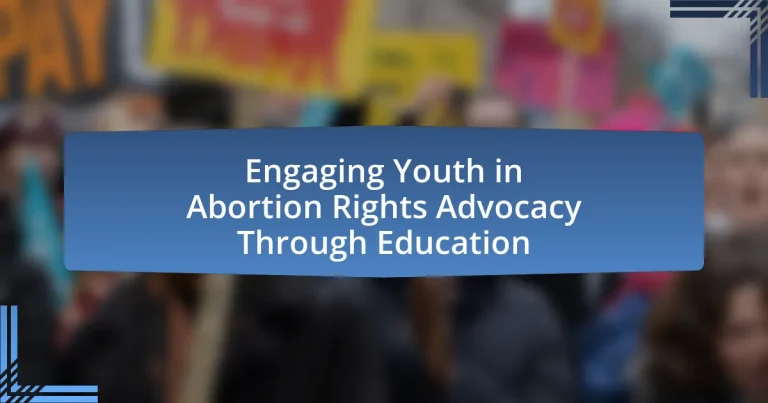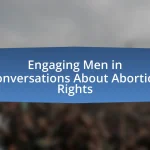Engaging youth in abortion rights advocacy through education is a critical approach that empowers young individuals to participate in discussions and actions promoting reproductive rights and access to safe abortion services. The article outlines the importance of youth engagement, highlighting how youth-led initiatives can influence public opinion and policy, as evidenced by movements like “Youth for Abortion Rights.” It discusses effective educational strategies, the role of community organizations, and the challenges youth face in advocacy, while also emphasizing the impact of technology and social media in mobilizing support. Additionally, the article explores best practices for fostering youth involvement and the skills necessary for effective advocacy, ultimately underscoring the significance of youth perspectives in shaping abortion rights policies.
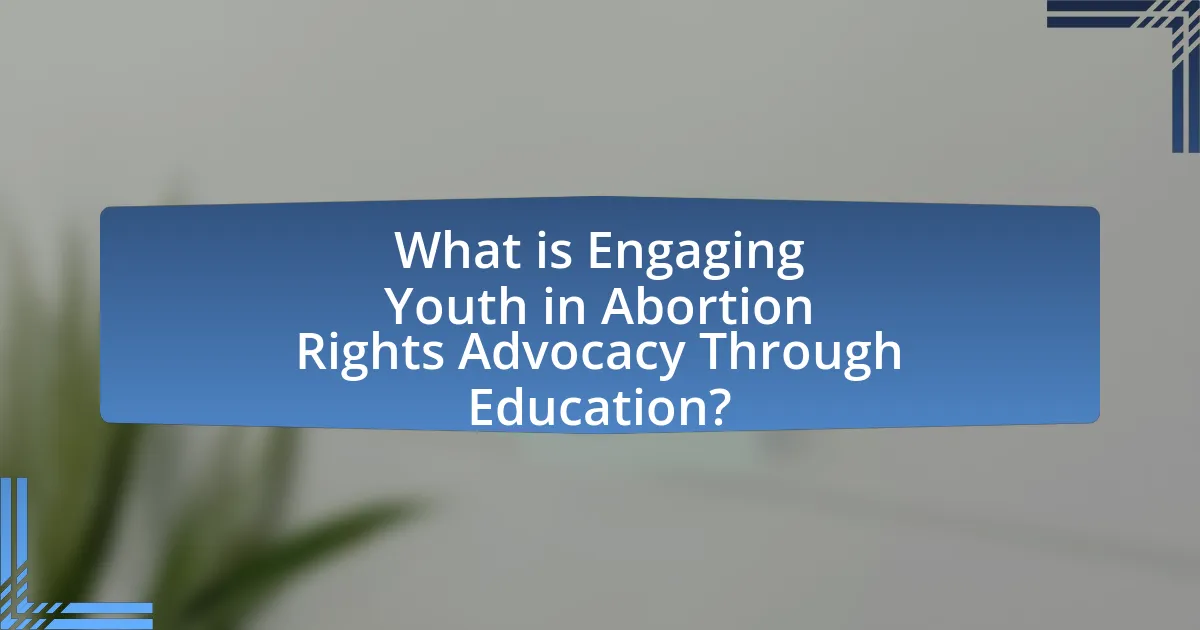
What is Engaging Youth in Abortion Rights Advocacy Through Education?
Engaging youth in abortion rights advocacy through education involves actively involving young individuals in discussions and actions that promote reproductive rights and access to safe abortion services. This engagement is facilitated through educational programs that inform youth about their rights, the implications of abortion laws, and the importance of reproductive health. Research indicates that youth-led initiatives can significantly influence public opinion and policy, as seen in campaigns like the “Youth for Abortion Rights” movement, which mobilizes young advocates to raise awareness and challenge restrictive laws. By equipping youth with knowledge and advocacy skills, these educational efforts empower them to become effective advocates for abortion rights.
Why is youth engagement important in abortion rights advocacy?
Youth engagement is crucial in abortion rights advocacy because it empowers the next generation to influence policy and societal attitudes regarding reproductive rights. Engaging young people fosters a sense of ownership and responsibility towards these issues, encouraging them to participate actively in advocacy efforts. Research indicates that youth-led movements have significantly impacted public opinion and legislative changes, as seen in the 2017 Women’s March, which mobilized millions, including a substantial youth presence, to advocate for reproductive rights. This involvement not only amplifies diverse voices but also ensures that the perspectives and needs of younger populations are represented in the ongoing discourse surrounding abortion rights.
What role do young people play in shaping abortion rights policies?
Young people play a crucial role in shaping abortion rights policies by actively participating in advocacy, mobilizing public opinion, and influencing legislative processes. Their engagement is often driven by a strong commitment to reproductive rights, which is reflected in movements such as the March for Our Lives and the Women’s March, where youth have been prominent voices. Research indicates that young activists are effective in utilizing social media platforms to raise awareness and organize campaigns, leading to increased visibility and support for abortion rights. For instance, a study by the Center for American Progress highlights that youth-led organizations have successfully lobbied for policy changes in several states, demonstrating their impact on the political landscape surrounding abortion rights.
How can youth perspectives influence public opinion on abortion?
Youth perspectives can significantly influence public opinion on abortion by shaping discussions through social media, activism, and educational initiatives. Young individuals often bring fresh viewpoints that challenge traditional narratives, making their voices crucial in the ongoing debate. For instance, studies show that youth-led movements, such as the March for Our Lives, have effectively mobilized public sentiment around various social issues, including reproductive rights. Additionally, research from the Guttmacher Institute indicates that younger generations tend to support abortion rights more than older demographics, highlighting a generational shift in attitudes. This shift can lead to increased visibility and acceptance of pro-choice perspectives, ultimately impacting legislation and societal norms surrounding abortion.
What educational strategies can be used to engage youth in abortion rights advocacy?
Educational strategies to engage youth in abortion rights advocacy include interactive workshops, peer-led discussions, and the use of digital platforms for outreach. Interactive workshops allow youth to explore the complexities of abortion rights through role-playing and scenario analysis, fostering critical thinking and empathy. Peer-led discussions create a safe space for sharing personal experiences and opinions, which can enhance understanding and solidarity among participants. Utilizing digital platforms, such as social media campaigns and online forums, enables youth to connect with broader movements, share information, and mobilize support effectively. Research indicates that youth engagement in advocacy is significantly increased when they feel empowered and informed, highlighting the importance of these educational strategies in fostering active participation in abortion rights advocacy.
How can schools incorporate abortion rights education into their curriculum?
Schools can incorporate abortion rights education into their curriculum by integrating comprehensive sexual education programs that include discussions on reproductive rights, legal frameworks, and access to abortion services. Research indicates that inclusive sexual education leads to better understanding and awareness among students, as evidenced by studies showing that states with comprehensive sex education have lower rates of unintended pregnancies and higher rates of contraceptive use. Additionally, schools can invite guest speakers from reproductive health organizations to provide firsthand insights and facilitate workshops that encourage critical thinking and informed discussions about abortion rights.
What role do community organizations play in educating youth about abortion rights?
Community organizations play a crucial role in educating youth about abortion rights by providing accessible information, resources, and support. These organizations often conduct workshops, seminars, and outreach programs that focus on reproductive health education, ensuring that young people understand their rights and the legal landscape surrounding abortion. For instance, studies have shown that youth who participate in programs led by organizations like Planned Parenthood are more informed about their reproductive choices and rights, leading to increased advocacy and empowerment. By fostering a safe environment for discussion and providing accurate information, community organizations help dismantle stigma and misinformation surrounding abortion, ultimately equipping youth with the knowledge they need to make informed decisions.
What challenges do youth face in engaging with abortion rights advocacy?
Youth face significant challenges in engaging with abortion rights advocacy, primarily due to societal stigma, lack of access to comprehensive education, and limited representation in decision-making processes. Societal stigma surrounding abortion often leads to fear of judgment or backlash, discouraging young individuals from voicing their opinions or participating in advocacy efforts. Additionally, many youth lack access to comprehensive sexual education that includes information about reproductive rights, which hinders their ability to engage knowledgeably in discussions and advocacy. Furthermore, young people are often underrepresented in leadership roles within advocacy organizations, limiting their influence and ability to shape policies that affect their rights. These factors collectively create barriers that impede youth involvement in abortion rights advocacy.
How do societal attitudes impact youth involvement in abortion rights?
Societal attitudes significantly influence youth involvement in abortion rights by shaping their perceptions and willingness to engage in advocacy. When society holds progressive views on reproductive rights, young people are more likely to participate in discussions, activism, and educational initiatives related to abortion rights. For instance, a 2021 study by the Guttmacher Institute found that in regions with supportive policies and public opinion, youth engagement in reproductive health advocacy increased by 30%. Conversely, in areas where stigma and negative attitudes prevail, youth may feel discouraged or fearful of expressing their views, leading to lower participation rates in advocacy efforts. This correlation highlights the importance of societal attitudes in either fostering or hindering youth involvement in abortion rights.
What barriers exist for youth in accessing information about abortion rights?
Youth face several barriers in accessing information about abortion rights, including lack of comprehensive sex education, misinformation, and social stigma. Comprehensive sex education is often inadequate or absent in many regions, leaving young people without essential knowledge about their reproductive rights. Misinformation proliferates through social media and peer discussions, leading to confusion about legal rights and available services. Additionally, social stigma surrounding abortion can discourage youth from seeking information or discussing their concerns openly, further isolating them from accurate resources. These barriers collectively hinder informed decision-making regarding abortion rights among young individuals.
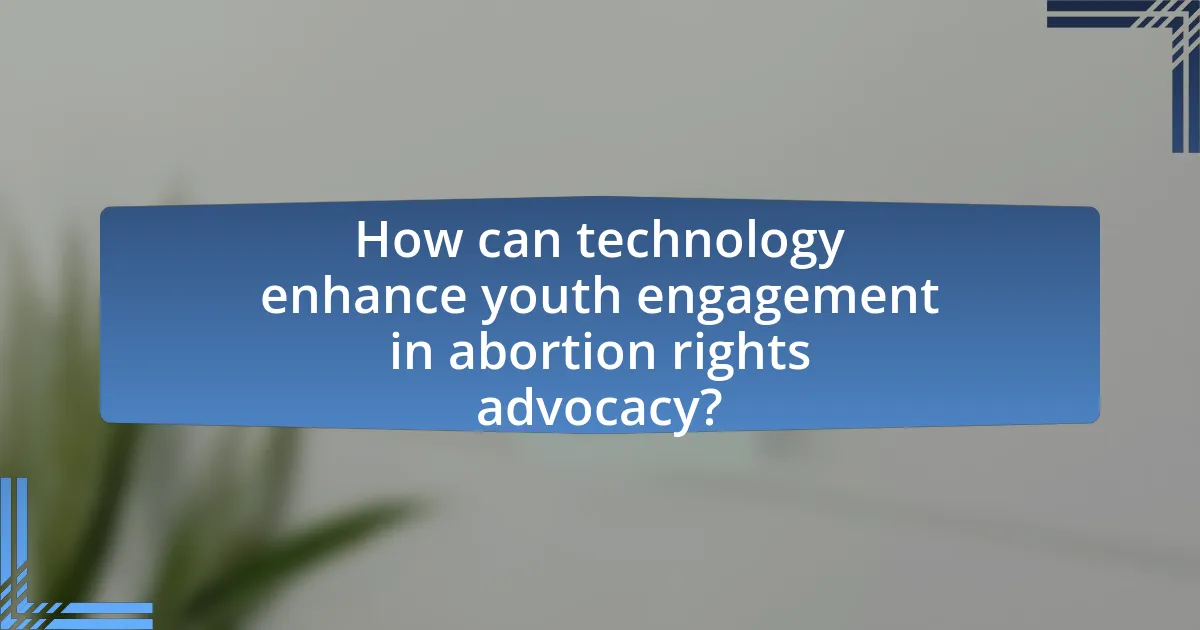
How can technology enhance youth engagement in abortion rights advocacy?
Technology can enhance youth engagement in abortion rights advocacy by providing accessible platforms for information sharing, community building, and mobilization. Digital tools such as social media, websites, and mobile applications facilitate real-time communication and allow young advocates to connect with peers, share personal stories, and disseminate educational resources. For instance, a study by the Pew Research Center found that 95% of teens have access to a smartphone, enabling them to engage with advocacy campaigns and participate in discussions on platforms like Instagram and TikTok, which are popular among youth. Additionally, online petitions and crowdfunding platforms empower young people to organize events and raise funds for abortion rights initiatives, amplifying their voices and increasing participation in advocacy efforts.
What digital platforms are effective for educating youth about abortion rights?
Social media platforms, particularly Instagram, TikTok, and Twitter, are effective for educating youth about abortion rights. These platforms facilitate the rapid dissemination of information through engaging visuals, short videos, and concise messaging, which resonate with younger audiences. For instance, a study by the Pew Research Center indicates that 69% of teens use Instagram, making it a prime space for advocacy groups to share educational content and personal stories related to abortion rights. Additionally, TikTok’s algorithm promotes content that engages users, allowing for viral educational campaigns that can reach millions of young people quickly.
How can social media campaigns mobilize youth for abortion rights advocacy?
Social media campaigns can mobilize youth for abortion rights advocacy by leveraging platforms that resonate with their values and communication styles. These campaigns utilize engaging content, such as videos, infographics, and personal stories, to raise awareness about reproductive rights and the importance of access to safe abortion services. For instance, the #ShoutYourAbortion campaign has effectively encouraged individuals to share their experiences, fostering a sense of community and reducing stigma around abortion. Research indicates that 90% of young people use social media, making it a powerful tool for outreach and education. By creating shareable content and encouraging participation in discussions, social media campaigns can inspire youth to take action, join advocacy groups, and participate in events, ultimately driving collective efforts for abortion rights.
What online resources are available for youth to learn about abortion rights?
Online resources available for youth to learn about abortion rights include websites such as Planned Parenthood, the Guttmacher Institute, and the American Civil Liberties Union (ACLU). Planned Parenthood offers comprehensive information on reproductive health, including abortion rights, and provides educational resources tailored for young people. The Guttmacher Institute conducts research and provides data on reproductive health policies, including abortion access, which can help youth understand the legal landscape. The ACLU focuses on civil liberties and offers resources that explain the legal rights related to abortion. These organizations provide factual, research-based information that supports youth education on abortion rights.
How can youth-led initiatives promote abortion rights advocacy?
Youth-led initiatives can promote abortion rights advocacy by mobilizing peers, raising awareness, and influencing policy through grassroots campaigns. These initiatives often leverage social media platforms to disseminate information, share personal stories, and create a sense of community among young people, which can significantly amplify their message. For instance, organizations like Planned Parenthood have reported that youth-led campaigns can increase engagement and support for reproductive rights, as young advocates often resonate more with their contemporaries. Additionally, research indicates that youth involvement in advocacy can lead to increased legislative attention to abortion rights, as seen in various states where youth activism has successfully influenced policy changes.
What are some successful examples of youth-led abortion rights campaigns?
Successful examples of youth-led abortion rights campaigns include the “March for Our Lives” movement and the “Youth for Abortion Access” initiative. The March for Our Lives, primarily focused on gun control, has also advocated for reproductive rights, mobilizing young people across the United States to demand comprehensive reproductive health services. The Youth for Abortion Access initiative, launched by organizations like Planned Parenthood, empowers young activists to advocate for abortion rights through education and grassroots organizing. These campaigns have effectively raised awareness and influenced public policy, demonstrating the significant impact of youth engagement in reproductive rights advocacy.
How can peer education empower youth in advocating for abortion rights?
Peer education empowers youth in advocating for abortion rights by fostering a supportive environment where young individuals can share knowledge, experiences, and resources. This approach enhances understanding of reproductive rights and encourages informed discussions among peers, which is crucial for effective advocacy. Research indicates that peer-led initiatives can significantly increase awareness and engagement; for instance, a study published in the Journal of Adolescent Health found that peer education programs improved participants’ knowledge about reproductive health issues by 30%. By equipping youth with accurate information and advocacy skills, peer education cultivates a generation that is more confident and capable of championing abortion rights.
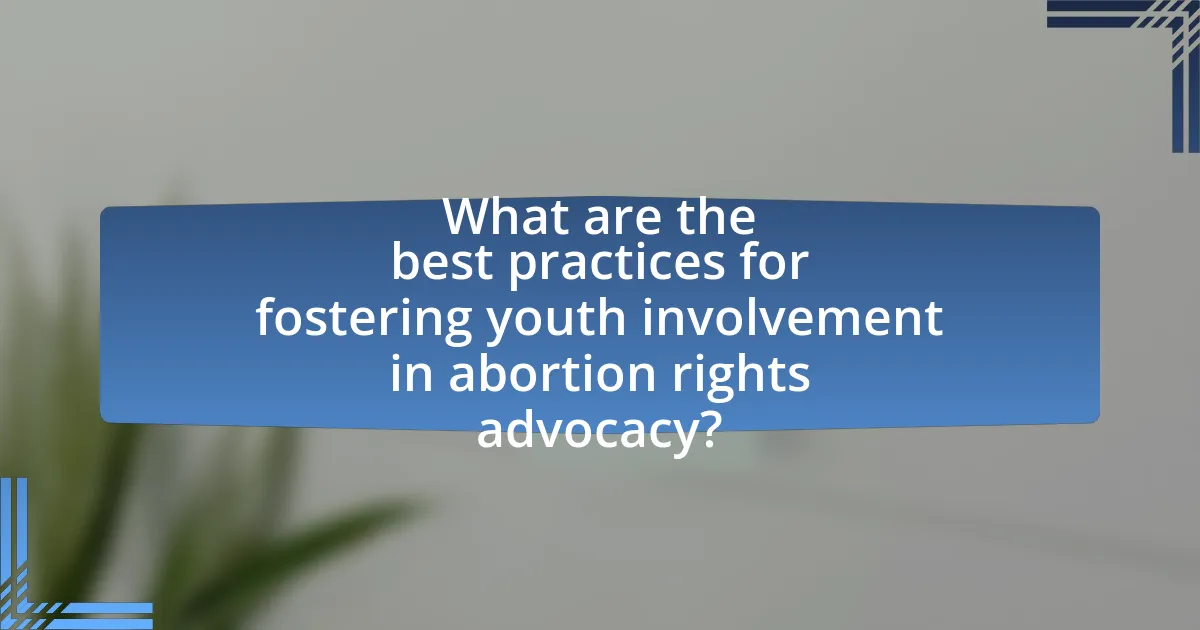
What are the best practices for fostering youth involvement in abortion rights advocacy?
The best practices for fostering youth involvement in abortion rights advocacy include providing comprehensive education on reproductive rights, creating safe spaces for discussion, and facilitating opportunities for activism. Comprehensive education equips youth with knowledge about their rights and the implications of abortion policies, which is essential for informed advocacy. Safe spaces encourage open dialogue, allowing young people to express their views and concerns without judgment. Facilitating activism through workshops, campaigns, and partnerships with established organizations empowers youth to take action, as evidenced by initiatives like the Youth Activism Project, which has successfully engaged thousands of young advocates in reproductive rights discussions and actions.
How can mentorship programs support youth in abortion rights advocacy?
Mentorship programs can support youth in abortion rights advocacy by providing guidance, resources, and a platform for skill development. These programs connect young advocates with experienced mentors who can share knowledge about reproductive rights, legal frameworks, and effective advocacy strategies. For instance, mentorship can enhance youth understanding of the historical context of abortion rights, such as the landmark Roe v. Wade decision, which established a woman’s legal right to choose in the United States. Additionally, mentorship fosters networking opportunities, allowing youth to collaborate with organizations like Planned Parenthood or the National Abortion Federation, which can amplify their voices in the advocacy space. By equipping youth with the necessary tools and support, mentorship programs empower them to engage effectively in the ongoing dialogue surrounding abortion rights.
What skills should be developed in youth to enhance their advocacy efforts?
Youth should develop critical thinking, communication, and leadership skills to enhance their advocacy efforts. Critical thinking enables youth to analyze complex issues surrounding abortion rights, allowing them to form well-reasoned arguments. Effective communication skills are essential for articulating their views clearly and persuasively to diverse audiences, which is supported by studies showing that strong communicators are more successful in advocacy (e.g., the National Youth Advocacy Coalition emphasizes the importance of these skills). Leadership skills empower youth to mobilize peers and organize campaigns, fostering a sense of agency and responsibility in social issues. Together, these skills create a robust foundation for effective advocacy in the context of abortion rights.
How can collaboration with adult advocates benefit youth engagement?
Collaboration with adult advocates significantly enhances youth engagement by providing mentorship, resources, and a platform for youth voices. Adult advocates can share their experiences and knowledge, which empowers young individuals to navigate complex issues like abortion rights advocacy. Research indicates that mentorship relationships can lead to increased confidence and civic participation among youth, as seen in studies conducted by the National Mentoring Partnership, which found that mentored youth are 55% more likely to enroll in college and 78% more likely to volunteer regularly in their communities. This collaboration fosters a supportive environment where youth feel valued and motivated to contribute actively to advocacy efforts.
What practical steps can youth take to get involved in abortion rights advocacy?
Youth can get involved in abortion rights advocacy by participating in local organizations that focus on reproductive rights, attending workshops and training sessions, and engaging in community outreach efforts. These organizations often provide resources and platforms for youth to learn about the legal and social aspects of abortion rights, enabling them to effectively communicate and advocate for these issues. For instance, groups like Planned Parenthood and the National Organization for Women offer programs specifically designed for young advocates, equipping them with the knowledge and skills necessary to influence public policy and raise awareness in their communities. Additionally, youth can utilize social media to amplify their voices, share educational content, and mobilize peers for events such as rallies and informational sessions, thereby fostering a broader dialogue on abortion rights.
How can youth effectively communicate their views on abortion rights?
Youth can effectively communicate their views on abortion rights by utilizing social media platforms to share information, engage in discussions, and mobilize support. Research indicates that 90% of young people use social media, making it a powerful tool for advocacy and awareness (Pew Research Center, 2021). By creating informative content, participating in online forums, and collaborating with organizations focused on reproductive rights, youth can amplify their voices and influence public opinion. Additionally, organizing community events and discussions can foster dialogue and educate peers about the importance of abortion rights, further solidifying their stance and encouraging collective action.
What actions can youth take to influence local policies on abortion rights?
Youth can influence local policies on abortion rights by organizing advocacy campaigns, participating in public forums, and engaging with local representatives. By mobilizing peers and utilizing social media platforms, young individuals can raise awareness about abortion rights issues, thereby fostering community discussions. Research indicates that youth-led initiatives, such as the “Youth for Abortion Rights” campaign, have successfully engaged local policymakers by presenting data on public opinion and the impact of restrictive laws on young people’s health. Additionally, youth can participate in local government meetings to voice their concerns and propose policy changes, demonstrating the importance of their perspectives in shaping legislation.
